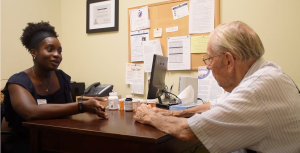Currently Funded Pilot Projects
Development of a Preventive Intervention for Older Adults Becoming Alzheimer’s Caregivers Based on the Transformational Resilience Model

Principal Investigator: Ann B. Brewster, Ph.D., Senior Research Scholar, Duke Social Science Research Institute
More than five million US citizens live with Alzheimer’s disease or related dementias (AD/ADRD), a number that will triple by 20501. Close to 67% live at home and rely on family caregivers2. AD/ADRD caregivers take on numerous responsibilities and frequently experience high levels of distress, often neglecting their own exercise and health practices3. About 30% of AD/ADRD caregivers are over 65 and face their own health challenges which they have less time to manage4. As a result, AD/ADRD caregivers all too frequently report decreased physical activity as well as symptoms of depression and distress5. AD/ADRD family caregivers represent a vulnerable population at significant risk for preventable physical/mental health outcomes6.
In this project, we will use the construct of transformational resilience (TR)7 to create a group-based intervention for new AD/ADRD caregivers who themselves are older adults. TR is a life-span developmental framework created to guide interventions for people facing significant adversity. TR offers a strengths-focused, framework for dealing with adversity that incorporates the individual’s history, goals for the future, and challenges they face in the present. By simultaneously emphasizing agency, self-compassion, and goal setting, TR provides validation and enhances motivation at a time when caregiver burden is already beginning to take a toll. The new intervention will be adapted from the PI’s ongoing research and is organized around empirically validated metacognitive skills that enhance problem solving and reinforce goals/values in the face of adversity.
Study Aims
Aim 1: Develop and refine a novel theory-based group preventive intervention to maintain the physical and mental health of new Alzheimer’s disease and related dementia (AD/ADRD) caregivers.
Aim 2: Conduct iterative protocol testing in three successive groups (total N = 18). We will conduct protocol user testing in three groups of six older adult AD/ADRD family caregivers beginning to serve in that role.
Targeted Health Coaching Intervention to Improve Physical Activity Maintenance and Mobility — Post-Structured Cardiac Rehabilitation Programming Among Older Adults: A Pilot Study (Target-CR)
 Principle Investigator: Kathryn Collins, PhD, Postdoctoral Scholar, Duke Center for Living
Principle Investigator: Kathryn Collins, PhD, Postdoctoral Scholar, Duke Center for Living
Summary: Approximately 800,000 individuals in the United States have a heart attack every year, with almost 1 in 4 of those individuals already having suffered a previous heart attack. Attending cardiac rehabilitation (CR) following a cardiovascular event improves cardiorespiratory fitness and health-related quality of life, as well as decreases the risk of future illness and death from heart disease. Unfortunately, once an individual finishes a CR program, continued participation in physical activity (PA) too often reverts to previous sedentary patterns, limiting beneficial health effects. Continued participation in PA post-CR is especially challenging among older adults – likely due to a lack of self-efficacy and confidence in their ability to perform PA due to either their age or other health conditions that make PA more challenging. However, the need to address other health conditions, in conjunction with the benefits of improved strength and mobility, makes continued PA participation following a structured CR program even more useful for older adults. Although individuals typically understand habitual participation in PA is good for their health, we poorly understand why some individuals successfully adhere to and maintain PA habits, while others succumb to barriers preventing them from maintaining the health benefits beyond CR. In addition to understanding factors and triggers influencing PA maintenance beyond CR, little research has developed or investigated interventions targeting this important transition period following structured CR programming to promote continued PA participation “at home”. Therefore, this proposal aims to 1) identify factors and triggers influencing PA participation after a traditional 36-session CR program (Stage 0); and 2) test a targeted health coaching intervention using these identified triggers to optimize PA maintenance and mobility among older adults who completed a center-based CR program.
The Feasibility of Using a Digital Health Application for Training and Support of Elder Caregivers
Principal Investigator: Cristina Hendrix, DNS, GNP-BC, FAAN
Associate Professor, Duke University School of Nursing Core Investigator – GRECC Durham VA HSC
The increasing complexity in home caregiving and the rising number of caregivers create an impetus to discover new approaches to support and train caregivers. Our prior studies show that caregivers benefited from enhanced support and training for discharge care through increased levels in caregiving preparedness.9-11 However, our face-to-face approach in our studies hindered our ability to reach many caregivers, especially those with disproportionate numbers of negative social determinants of health such as living in rural areas, lack of access to transportation, and lack of leave opportunities at work. One viable solution to maximize reach and access to programs is the use of technology.
Our proposed pilot will investigate the feasibility of using a digital health application, Communication, Learning, Advocacy, Resources and Expertise (CLARE), in training and support of family and friends (i.e., caregivers) of older adults, many of whom are elders themselves.1 Our training and support will focus on discharge care of patients including early mobility, and self-care among caregivers through walking activities. We have three study aims: (1) to test the feasibility of CLARE in caregiving training and support during the early days of hospital discharge; (2) to use the Unified Theory of Acceptance and Use of Technology behavioral framework (UTAUT)2 to determine factors that will promote intent and use of CLARE among elder caregivers; and (3) (exploratory) – to explore preliminary efficacy of CLARE in improving caregiving preparedness to inform effect size and variability in outcome for our future work.
Previously Funded Pilots

SPA-Scalable Implementation Study
Principal Investigator(s):
- Eleanor McConnell, PhD, RN, Duke School of Nursing
- Gina Upchurch, RPh, MPH, Senior PharmAssist
Senior PharmAssist: Co-Design and Evaluation of a Toolkit
to Promote Scalable Implementation
The purpose of this research study is to facilitate and evaluate
the scalability of implementing the Senior PharmAssist (SPA) model. The
nonprofit Senior PharmAssist began its work in 1994 in Durham, North Carolina
(NC). Community-dwelling older adults often experience negative health impacts
related to inappropriate medication use and challenges navigating a complex web
of social and community-based supports, especially older adults with limited
incomes and those living in historically marginalized communities. The goal of the
SPA model is to improve the well-being of older adults by focusing on medication
management and access, connecting individuals to other meaningful services and
supports, and ensuring they have the medical coverage they need and can afford.
Together these services support functional ability and quality of life among community-dwelling older adults.
The SPA model features four core components:
- medication therapy management
- medication copayment assistance
- tailored community referrals
- Medicare insurance counseling
The delivery of these components is based upon broad-based community collaboration and supported by three pillars including using motivational interviewing tools, employing a
racial equity framework, and emphasizing continuity of care. The model has
shown positive impacts among older adults in Durham County, but further research
is needed to effectively implement the model more broadly.
This NIH-Stage V study aims to:
- Co-develop a SPA implementation toolkit with participants from three diverse NC communities interested in adopting the SPA model, and
- Implement the SPA model using multiple small tests of the toolkit’s tools and processes and examine the organizational-level barriers and facilitators to implementation.
The study uses a convergent mixed-methods case study design. Co-design sessions, learning collaborative sessions, interviews, focus groups, and surveys will be used to
achieve the aims.







